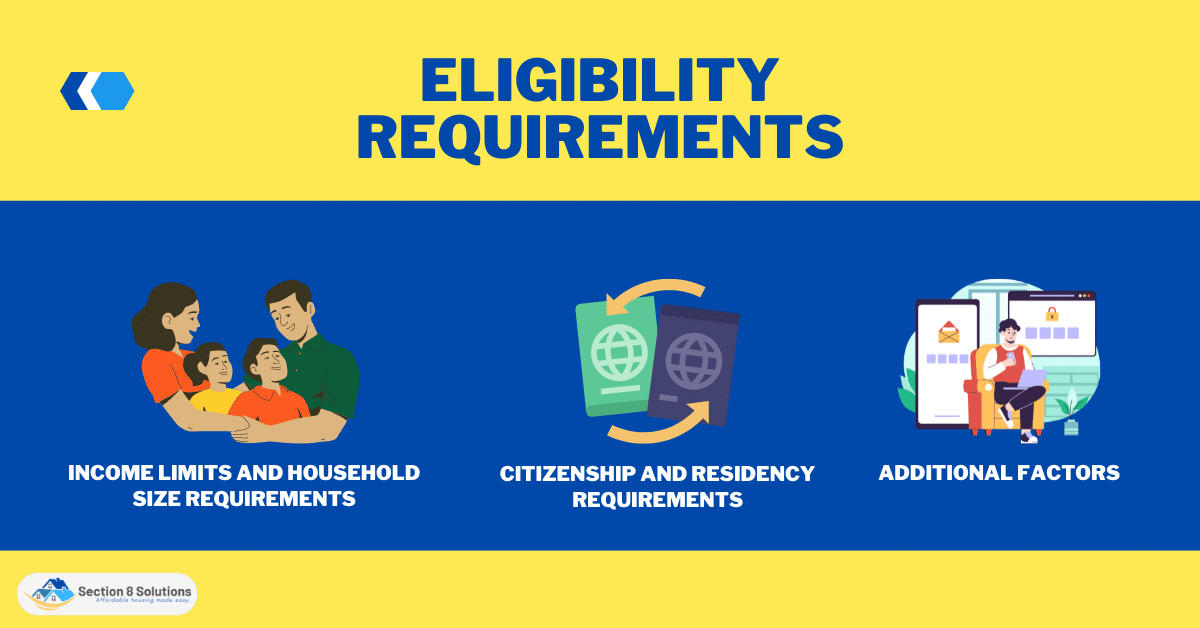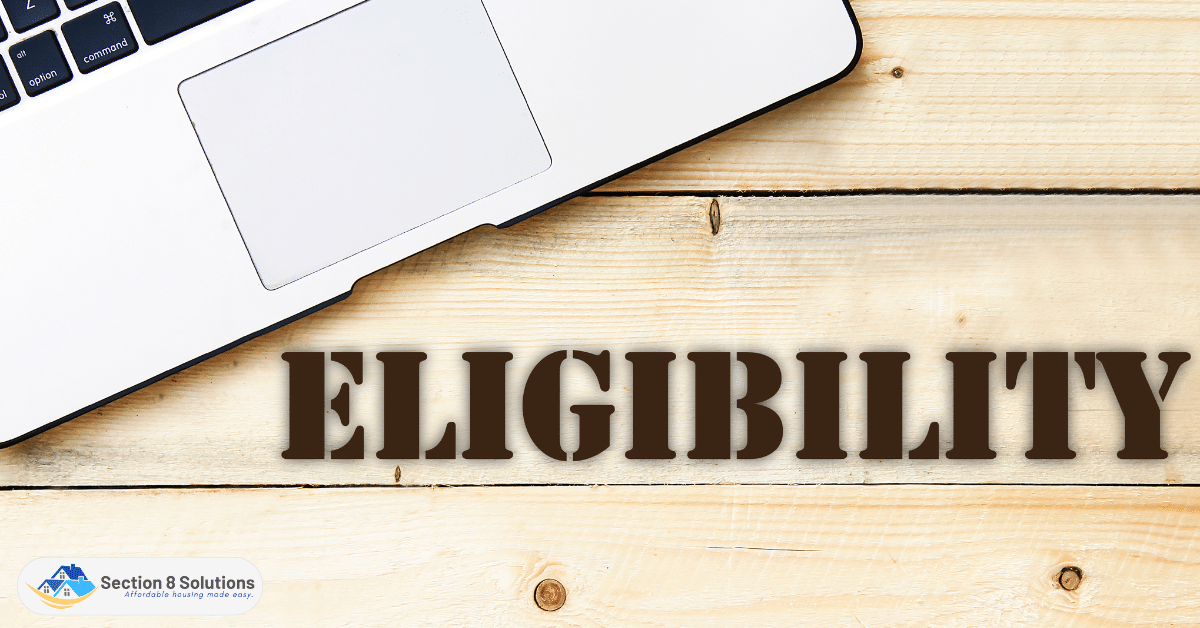Tennessee’s Section 8 program helps low-income families afford safe and quality housing. This initiative gives tenants vouchers to pay a portion of their rent to participate landlords. This program requires income and household size.
In this comprehensive guide, we will provide you with all the information you need to know about Tennessee’s Volunteer State Section 8 Assistance program. We will discuss program eligibility, application, and tenant and landlord duties.

Eligibility Requirements
To qualify for Tennessee’s Volunteer State Section 8 Assistance program, applicants must meet certain eligibility requirements. The program is designed to assist low-income families in obtaining safe and decent housing. Here are the eligibility requirements for the program:

1. Income Limits and Household Size Requirements
The income limits and household size requirements are crucial factors in determining eligibility for Tennessee’s Volunteer State Section 8 Assistance program. The program is designed to assist low-income families who are struggling to afford safe and decent housing.
The maximum income limit for the program varies depending on the size of the household. Generally, the larger the household, the higher the maximum income limit. For example, a household of one person in Davidson County may have a maximum income limit of $28,450, while a household of eight people may have a maximum income limit of $56,650.
To determine eligibility, the Housing Authority will consider the total gross income of all household members. Gross income includes wages, tips, Social Security, and any other income received by the household. The Housing Authority will also consider the household size when determining eligibility. Household size includes all individuals who will be living in the unit, regardless of age or relationship.

2. Citizenship and Residency Requirements
The citizenship and residency requirements are essential eligibility criteria for Tennessee’s Volunteer State Section 8 Assistance program. To be eligible for the program, applicants must meet both of these requirements.
Firstly, applicants must be either U.S. citizens or nationals or have eligible immigration status. This means that applicants must be able to provide proof of their legal status in the United States. Applicants who are not U.S. citizens or nationals must have eligible immigration statuses, such as a Green Card or a visa, to qualify for the program.
Secondly, applicants must be residents of the state of Tennessee to qualify for the program. This means that applicants must be able to provide proof of their Tennessee residency. The Housing Authority may require applicants to provide documents such as a driver’s license or a utility bill to verify their residency.
Note that meeting citizenship and residency requirements does not guarantee program enrollment. The Housing Authority uses a waiting list to manage applicants for rental assistance since demand exceeds resources.

3. Additional Factors
In addition to the basic eligibility requirements, there are additional factors that may impact an applicant’s eligibility for Tennessee’s Volunteer State Section 8 Assistance program. One of the most significant factors is an applicant’s criminal history.
Every 18-year-old adult household member must undergo a criminal background check by the Housing Authority. Any household member with a criminal record may be denied admittance by the Housing Authority. The Housing Authority will assess each household member’s criminal history depending on severity and recency.
Drug, violence, and sex convictions may affect eligibility. The program may also exclude household members on probation or parole. When assessing an applicant’s criminal history, the Housing Authority may consider mitigating factors like rehabilitation or stable employment.
The Housing Authority may reject applicants for additional reasons. If an applicant was evicted from federally supported housing for drug-related crime within three years, they may be refused. If an applicant cannot follow program guidelines, the Housing Authority may deny admittance.

How to Apply
Applying for Tennessee’s Volunteer State Section 8 Assistance program can be a complex process, but with the right information, it can be manageable. Here is a step-by-step guide on how to apply:
Step 1: Determine Eligibility
Determining eligibility is an essential step for applicants interested in Tennessee’s Volunteer State Section 8 Assistance program. As mentioned earlier, the program has specific eligibility requirements that applicants must meet to qualify. These requirements include income limits, household size requirements, and citizenship and residency requirements.
To determine eligibility, applicants must first calculate their household income to ensure it falls below the income limits set by the program. The income limits vary depending on the size of the household and the county in which they reside. To qualify for the program, the household income must be below 50% of the area median income (AMI) for their county.
Applicants must also ensure that their household size meets the requirements for the program. The maximum income limit varies depending on the size of the household. Applicants must accurately report the number of people living in their household to determine their eligibility.
Finally, applicants must meet the citizenship and residency requirements. Applicants must be U.S. citizens, or nationals, or have eligible immigration status. They must also be residents of the state of Tennessee to qualify for the program.

Step 2: Gather Required Documents
Gathering the required documentation is a crucial step in the application process for Tennessee’s Volunteer State Section 8 Assistance program. The Housing Authority will require applicants to provide documentation that supports the information provided in their application. Some of the required documents include:
- Income verification: Applicants must provide proof of income for all household members. This includes pay stubs, tax returns, and other documentation that shows their income sources.
- Proof of citizenship: Applicants must provide documentation that verifies their U.S. citizenship, nationality, or eligible immigration status. This can include a birth certificate, passport, or immigration documents.
- Residency documentation: Applicants must provide documentation that verifies their residency in the state of Tennessee. This can include a lease agreement, utility bill, or driver’s license.
- Additional documentation: Applicants with specific circumstances, such as a disability, may be required to provide additional documentation to support their application.
Before applying, applicants must have the necessary papers. Incomplete applications will be rejected, and missing paperwork may delay processing. Applicants should contact their local Housing Authority or the THDA for information on required papers and how to obtain them.

Step 3: Submit an Application
To submit an application for Tennessee’s Volunteer State Section 8 Assistance program, applicants must fill out a comprehensive application form that can be found on the Tennessee Housing Development Agency (THDA) website. Alternatively, they can obtain a physical copy of the application form from their local Housing Authority office.
The application form requires applicants to provide detailed information about their household, including the names and ages of all household members, their relationship to the head of household, and their income sources. Applicants will also need to provide documentation to support their application, such as proof of income, citizenship, and residency.
Once completed, the application must be submitted to the local Housing Authority office or the THDA. Applicants must ensure that they have provided all necessary documentation to support their application, as incomplete applications will not be considered.
It’s worth noting that the demand for affordable housing is high, and therefore, there may be a waiting list for the program. The waiting list is typically managed on a first-come, first-served basis, with priority given to families with the greatest need.

Step 4: Attend an Interview
Once an application is submitted for Tennessee’s Volunteer State Section 8 Assistance program, applicants will be scheduled for an interview with the Housing Authority. The interview is an important step in the application process as it allows the Housing Authority to verify the information provided in the application and assess the eligibility of the applicant.
During the interview, the Housing Authority will ask applicants to provide additional information and documentation to support their application. Applicants will be notified in advance of the interview and will be provided with a list of documents that they need to bring. It is essential for applicants to come to the interview fully prepared and to bring all required documentation.
The interview is also an opportunity for the Housing Authority to explain the program’s rules and regulations to the applicant. They will discuss the applicant’s responsibilities under the program, such as paying their portion of the rent, and how the program will benefit them.

Step 5: Wait for the Notification
After the interview, applicants will receive a notification of their eligibility for Tennessee’s Volunteer State Section 8 Assistance program. If the applicant is deemed eligible, they will be placed on a waiting list until funding becomes available. It’s important to note that the waiting list may be long, and it may take several months or even years before the applicant’s name is called.
The waiting list is based on a first-come, first-served basis, with priority given to applicants who are homeless or living in substandard housing, victims of domestic violence, or those displaced by government action. Applicants who are placed on the waiting list are encouraged to keep their contact information updated with the Housing Authority to ensure they can be reached when their name comes up.
Once funding becomes available and the applicant reaches the top of the waiting list, the Housing Authority will contact them to schedule an appointment to receive a voucher. The voucher can be used to pay a portion of the rent for an approved housing unit. The applicant will be responsible for paying the remaining portion of the rent directly to the landlord.

Step 6: Receive Assistance
The Housing Authority will contact applicants for rental assistance as funding becomes available. After signing a lease with the landlord, the Housing Authority will pay a portion of the rent straight to the landlord. The applicant must pay the landlord the remaining rent.
The program’s rental assistance depends on the family’s income, size, and rental rates. The Housing Authority decides how much rental help to give the applicant. The applicant should be aware that the program’s rental aid may not cover the full rent and they may have to pay a portion.
Program rental aid is temporary. The applicant’s support period depends on financing, income, and family conditions. To keep their rental assistance suitable, Housing Authority recipients must report changes in income, family size, and living circumstances.

Tenant Responsibilities
Tennessee Section 8 tenants have responsibilities to maintain eligibility. They must pay their rent on time, maintain their unit, and notify the Housing Authority of income or family size changes. Tenants must also follow program guidelines, which may limit the number of tenants, income from illicit activities, and unit changes without landlord authorization.
To maintain eligibility for the program, tenants must continue to meet the program’s income and household size requirements. They must also report any changes in income or family size to the Housing Authority promptly. Failure to report changes can result in overpayment of rental assistance, which can lead to the tenant being required to repay the overpayment.
Violators may lose rental assistance or be evicted. The Housing Authority may also force renters to reimburse rental assistance paid while they violated program regulations. Contact the Housing Authority if you need help meeting your obligations or following program restrictions. Counseling or other support from the Housing Authority may help residents retain program eligibility.

Landlord Responsibilities
Tennessee’s Volunteer State Section 8 Help landlords must follow program standards. Safe, decent, program-compliant housing is a top priority. Landlords must comply with local housing rules, make repairs, and provide heat, hot water, and electricity.
Landlords should contact the local Housing Authority to learn about the program and its criteria. The Housing Authority requires landlords to sign a contract with program terms. Landlords must also allow the Housing Authority to inspect the rented property regularly to guarantee program compliance.
Maintaining compliance with program rules and regulations is essential for landlords participating in the program. Failure to maintain compliance can result in termination from the program, as well as penalties and fines. Landlords must also comply with fair housing laws and cannot discriminate against tenants based on race, color, religion, national origin, sex, disability, or familial status.
If a landlord violates program rules, the Housing Authority may take a variety of actions to address the violation. This can include issuing warnings, requiring corrective action, imposing fines or penalties, or terminating the landlord’s participation in the program. The Housing Authority may also withhold rental assistance payments until the violation is addressed.

Voucher Payment and Usage
The voucher payment for Tennessee’s Volunteer State Section 8 Assistance program is determined by the Housing Authority and is based on the fair market rent for the area where the rental unit is located. The payment is intended to cover a portion of the rent and utilities for the eligible household.
The amount of the voucher payment may vary depending on the size of the household and the number of bedrooms needed. The Housing Authority will consider factors such as income and family size when calculating the voucher payment.
To use the voucher, tenants must first find a rental unit that meets program requirements and is approved by the Housing Authority. Once the tenant has signed a lease with the landlord, the Housing Authority will pay the approved portion of the rent directly to the landlord. The tenant is responsible for paying any remaining balance to the landlord.
It is important for tenants to report any changes in income or household size to the Housing Authority, as this may impact the voucher payment amount. Failure to report changes may result in overpayment or underpayment of the voucher, which could result in the termination of assistance.

Conclusion
In conclusion, the Volunteer State Section 8 Assistance program in Tennessee provides rental assistance to eligible low-income families. To qualify, applicants must meet income, household size, citizenship, and residency requirements. Landlords and tenants both have important responsibilities to maintain program compliance.
Voucher payments are distributed to eligible tenants to pay for rent and utilities. Readers interested in learning more about the program can visit the Tennessee Housing Development Agency website or contact their local Housing Authority office. Those who meet the eligibility requirements are encouraged to apply for this valuable program.










